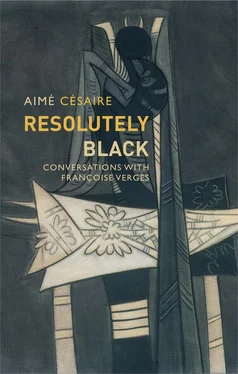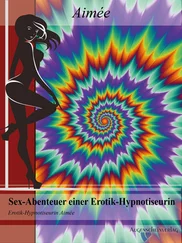These interviews present a distillation of Césaire’s thinking on a variety of issues. He told me several times, “I’ve said everything,” to which I didn’t really know how to respond. And then all of a sudden, he’d light up again and read long excerpts from his poems or from one of his plays, or he’d give a lively and detailed response to one of my questions. He had in effect said a lot and, as he liked to recall, he was a poet first. His profoundly original mind, his mental universe shows how he occupied several worlds at once and entertained relations both deeply felt and reimagined with each on a local and global scale. He looked weary, weary from having to explain himself so much over the years and from having been so poorly understood. I could understand this. He’d rather go for a walk on his island, he told me, and see people who didn’t ask him to explain himself but were just happy to talk about the weather, or plants, or other mundane matters. One day, after driving all over the island, he took my hand and told me how hard it was to grow old. He was losing control over his own body, he said. I didn’t know what to say. Speaking openly and honestly about the body’s decline is a taboo he clearly didn’t mind breaking. I was taken aback.
This man known throughout the world kindly responded to people’s requests and welcomed with the utmost courtesy students, artists, politicians, journalists, and even tourists who came to greet him. And he never forgot to ask about their lives as well, especially Martinicans eager to meet him: the person who waited in front of his office to introduce to him his French-born granddaughter, or the one who crossed paths with him in the street and asked him how he was doing. This man whom Martinicans always called “Papa Césaire” – an expression his friend Michel Leiris rightly judged a relic of African cultures where respect and esteem for a well-considered individual elicited the use of a parental term, which the French, for their part, perceived as a symptom of the backwardness of Antilleans – never cut himself off from the world, but didn’t want to be called upon to justify himself. And yet he was kind enough to respond to my questions, which dealt neither with his poetry nor his plays, but rather with more general topics: slavery and reparations, the French Republic and structural racism, the solitude of power.
1 Discourse on Colonialism (1972). Translated by Joan Pinkham (Monthly Review Press, 2000); Journal of a Homecoming. Translated by N. Gregson Davis (Duke University Press, 2017). Anglophone readers are fortunate to be able to choose from three widely available translations of Césaire’s seminal work Cahier d’un retour au pays natal. The 1968 translation by John Berger and Anna Bostock – Return to My Native Land, reissued by Archipelago Books in 2014 – has been complemented by two recent translations: a bilingual edition translated by Clayton Eshleman and A. James Arnold (Notebook of a Return to the Native Land, in The Complete Poetry of Aimé Césaire (Wesleyan University Press, 2017)) and, appearing at the same time, N. Gregson Davis’s translation, cited above. All three have much to recommend them, but Davis’s bilingual edition seemed to me to offer the most nuanced reading of Césaire’s poem. For a comparison of these three translations, see David B. Hobbs, “At the Living Heart: Translating Aimé Césaire,” The Nation, July 3, 2018. https://www.thenation.com/article/at-the-living-heart/2 Quoted in Daniel Guérin, Les Antilles décolonisées (Présence Africaine, 1956), p. 8. 3 Journal of a Homecoming, p. 77. 4 Michel Leiris, 30 octobre 1949, in Journal: 1922–1989. Edited by Jean Jamin (Gallimard, 1992, p. 473. 5 Ibid. 6 See his 2003 interview with K. Konaré and A. Kwaté in Césaire et Nous. Une rencontre entre l’Afrique et les Amériques au xixe siècle (Cauris Éditions, 2004), p. 11. 7 Aimé Césaire, “Pour la transformation de la Martinique en région dans le cadre d’une Union française fédérée,” Speech Delivered at the Constitutive Congress of the Parti Progressiste Martiniquais, March 22, 1958 (author’s archives). 8 Aimé Césaire, Toussaint Louverture (Présence Africaine, 1962); The Tragedy of King Christophe. Translated by Paul Breslin and Rachel Ney (Northwestern University Press, 2015); Victor Schœlcher et l’abolition de l’esclavage (Éditions Le Capucin, 2004) (reprinted from Esclavage et colonisation, PUF, 1948). 9 Les Indigènes de la République began as an anti-discriminatory movement in 2005 that viewed France’s colonial history as the source of its ongoing problems with discrimination, which became part of a larger national discussion after riots erupted in the Parisian banlieues in 2006. It later became its own political party, Parti des Indigènes de la République (PIR), which is still active today. Translator’s note.
Конец ознакомительного фрагмента.
Текст предоставлен ООО «ЛитРес».
Прочитайте эту книгу целиком, на ЛитРес.
Безопасно оплатить книгу можно банковской картой Visa, MasterCard, Maestro, со счета мобильного телефона, с платежного терминала, в салоне МТС или Связной, через PayPal, WebMoney, Яндекс.Деньги, QIWI Кошелек, бонусными картами или другим удобным Вам способом.












